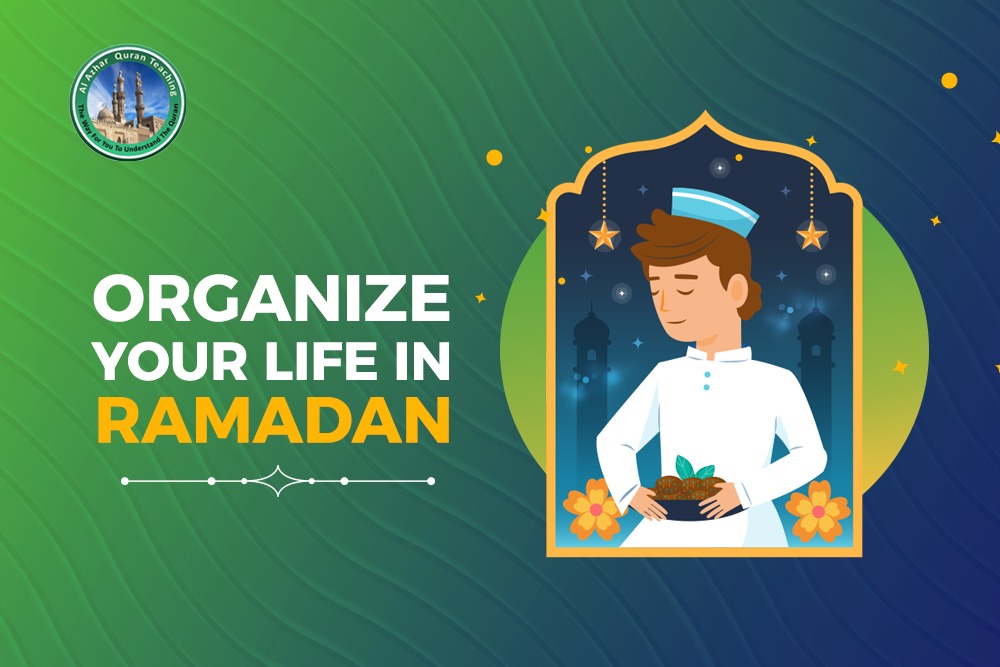Organize Your Life in Ramadan
Discover the transformative power of organizing your life during the sacred month of Ramadan. Achieve spiritual growth, enhanced focus, and a harmonious balance between your religious duties and daily life.
Planning Your Ramadan Schedule
Creating a Balanced Daily Routine
The essence of Ramadan lies in creating a harmonious routine that blends spiritual practices with everyday responsibilities. Designing a schedule that includes prayers, Quran recitation, and acts of kindness, alongside work and family time, paves the way for a fulfilling and spiritually enriching month.
Setting Goals for the Month
Define clear, achievable goals for Ramadan to anchor your daily activities with purpose and direction. Whether it’s completing the Quran or engaging in more charitable activities, goals keep you focused and motivated, turning aspirations into tangible outcomes.
Disorganized vs Organized Approaches in Ramadan
The Consequences of a Disorganized Approach
Without a structured plan, Ramadan can become overwhelming, leading to missed opportunities for spiritual growth and personal development. A disorganized approach results in stress, unbalanced priorities, and a less fulfilling experience.
The Benefits of an Organized Approach
Conversely, an organized Ramadan transforms the holy month into a period of profound growth and productivity. It allows for a deeper spiritual connection, better stress management, and a more balanced approach to daily obligations.
Organizing Your Household for Ramadan
Meal Preparation and Nutrition
Prepare for Ramadan by planning nutritious meals for Suhoor and Iftar. A well-organized kitchen and a meal plan ensure healthy eating habits, leaving more time for worship and family.
Establishing a Cleaning Schedule
A clean, peaceful environment is conducive to reflection and prayer. Set a cleaning schedule before Ramadan to maintain a serene home throughout the month, enabling better focus and tranquillity.
Personal Organization During Ramadan
Optimizing Sleep Patterns
Adopt the Prophet’s recommended sleep habits to ensure adequate rest during Ramadan. Align your sleep schedule with prayer times to remain energized and focused, enhancing your fasting and spiritual practices.
Managing Energy and Fasting
Maintain your composure and energy by balancing your diet and activities. Prioritize demanding tasks early in the day and incorporate breaks to stay refreshed and focused.
Staying on Top of Prayer Times and Quran Recitation
Leverage technology or traditional methods to keep track of prayer times and Quran progress. Regular recitation and prayer strengthen your faith and enhance your Ramadan experience.
Managing Work and Personal Responsibilities
Balance your professional and personal life by scheduling and prioritizing effectively. This ensures that you fulfil your religious obligations while managing daily tasks efficiently.
Maintaining Physical and Mental Health during Ramadan
The Importance of Physical Activity
Incorporate light physical activities into your Ramadan routine to maintain energy and health. Exercise helps in stay active and supports your fasting journey.
Practicing Mindfulness and Stress Management
Engage in mindfulness and stress management techniques to enhance your mental well-being. Practices like meditation and deep breathing contribute to a more focused and serene Ramadan.
Organize Your Life in Ramadan
Organizing your life during Ramadan can bring numerous benefits to your overall well-being. By structuring your routine efficiently, you can optimize your time for spiritual growth, self-reflection, and productivity. When you plan your day meticulously, you create a sense of discipline and focus that can enhance your spiritual practices such as prayer, reading the Quran, and engaging in acts of generosity and kindness. This structured approach can also help you prioritize tasks, manage stress effectively, and maintain a harmonious balance between your religious duties and daily responsibilities.
Planning Your Ramadan Schedule
Creating a Balanced Daily Routine
When organizing your life during Ramadan, it is crucial to create a balanced daily routine that allows you to efficiently allocate time for both religious practices and daily responsibilities. A structured schedule helps in maintaining a sense of discipline and focus, enabling you to make the most of this holy month. By incorporating time for prayer, Quran recitation, charitable acts, work, and family obligations, you can strike a harmonious balance that nurtures both your spiritual growth and worldly duties.
Setting Goals for the Month
Setting clear and achievable goals for the month of Ramadan is essential for making progress in your spiritual journey. By defining specific objectives such as completing a certain number of Quran chapters, increasing acts of charity, or improving personal habits, you can stay motivated and purposeful throughout the month. With a well-defined plan in place, you can ensure that each day brings you closer to achieving your spiritual aspirations and fulfilling your obligations effectively.
Comparison between Disorganized and Organized Approach in Ramadan:
| Disorganized Approach | Organized Approach |
| Failing to prioritize tasks | Setting daily goals and priorities |
| Feeling overwhelmed and stressed | Maintaining a sense of calm and focus |
| Missing out on spiritual opportunities | Actively seeking moments for spiritual growth |
| Procrastination on important tasks | Completing tasks on time |
| Lack of balance between spiritual and worldly tasks | Striking a harmonious balance in daily activities |
By adopting an organized approach during Ramadan, you can maximize the benefits of this blessed month and enhance your spiritual connection while fulfilling your daily obligations efficiently.
Organizing Your Household for Ramadan
When preparing your household for Ramadan, it is advisable to plan and prepare meals and snacks in advance. By organizing your kitchen supplies and creating a meal schedule, you can ensure that you have nutritious food readily available for Suhoor and Iftar. This proactive approach not only saves time but also allows you to focus on spiritual activities during this blessed month.
Setting Up a Cleaning Schedule
Establishing a cleaning schedule for your home before Ramadan begins can help you maintain a tidy and organized living space throughout the month. Divide cleaning tasks among family members or schedule specific chores for each day to prevent last-minute stress. A clean and clutter-free environment can create a peaceful atmosphere, conducive to prayer and reflection, enhancing your overall Ramadan experience.
Personal Organization During Ramadan
Sleep well
To ensure a proper rest during Ramadan, consider these tips recommended by the Prophet (peace be upon him):
-
- Return from Tarawih prayers by 10:00 PM and sleep by 11:00 PM to wake up for sahur.
- Follow the Prophet’s tradition of eating before Fajr.
- Rest after Fajr or take a power nap after Zhuhr for 15-20 minutes.
- Highlight the benefits of afternoon naps for a fasting person.
- Explore both spiritual and physical advantages of fasting with a healthy body.
Manage your energy effectively Fasting
Should aim to promote a calmer, more composed demeanor. It serves as a lesson in discipline and self-restraint and prompts consistent mindfulness of moderation and endurance. Given that the body acquires energy from various sources, it is essential to regulate consumption between Fajr and Maghrib. Prioritize demanding tasks early in the day to avoid exhaustion and schedule rest breaks while ensuring adequate oxygen intake. Stress often results from inadequate breathing and excessive worry. Identify time-wasting activities and minimize them to conserve energy wisely.
Staying on Top of Prayer Times and Quran Recitation
When preparing for Ramadan, ensuring you stay organized can significantly impact your spiritual growth during the holy month. By setting reminders for prayer times and allocating specific slots for Quran recitation each day, you can cultivate a deep connection with your faith. Utilizing technology or traditional methods to track prayer timings and progress in Quran reading can enhance your spiritual journey and keep you motivated throughout Ramadan.
Managing Work and Personal Responsibilities
Efficiently managing your work commitments and personal responsibilities during Ramadan is crucial for a balanced and productive month. By creating a schedule that allocates time for work, family, worship, and self-care, you can avoid last-minute rushes and ensure a harmonious routine. Prioritizing tasks based on importance and deadlines, as well as delegating where possible, can help you maintain focus and reduce stress levels. Striking a balance between work obligations and spiritual endeavors is key to making the most of this sacred time.
Physical and Mental Health in Ramadan
During Ramadan, maintaining a focus on physical health is crucial for your overall well-being. Regular exercise plays a vital role in keeping your body active and energetic, even during fasting hours. Incorporating simple activities like walking, stretching, or light cardio into your daily routine can help improve circulation, stamina, and mood. Additionally, paying attention to healthy eating habits is essential to provide your body with the necessary nutrients for sustenance. Opt for balanced meals during Suhoor and Iftar that include fruits, vegetables, proteins, and complex carbohydrates to ensure sufficient energy levels throughout the day.
Practicing Mindfulness and Stress Management
Amid the spiritual practices of Ramadan, prioritizing your mental health is equally important. Practicing mindfulness through activities such as meditation, deep breathing, or reflection can help center your thoughts and emotions, fostering a sense of tranquility and gratitude. Stress management techniques, such as time management, setting boundaries, and seeking support from loved ones, are essential in navigating daily challenges with resilience and composure. By nurturing both your physical and mental well-being, you can enhance your Ramadan experience and approach each day with renewed vitality and clarity.

